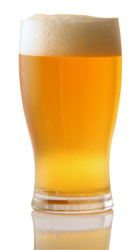
Additrional Conversion Of Mash & Wort
#1

Posted 07 July 2009 - 09:46 PM
#2

Posted 07 July 2009 - 10:13 PM
I hope you see what I am getting at. Did I undo some (or all) of the 154° mash effort when the mash and wort passed through the 150° range?
#3

Posted 08 July 2009 - 04:14 AM
#4

Posted 08 July 2009 - 05:57 AM
Edited by JKoravos, 08 July 2009 - 06:04 AM.
#5

Posted 08 July 2009 - 08:06 AM
I tasted a sample of my brown ale Tuesday night (brewed Sunday afternoon) and for being 52 hours old, it is already tasting very good. I am excited to see how good it comes out after it has aged.My question is not inspired by a trouble shooting a problem, but for from a hypothetical standpoint. I am always interested to know what the science and professionals have to say on a subject.'tis a good question. It comes down to the denaturation of α-amylase during the mash. Obviously a 168°F mashout denatures the enzymes pretty quickly, but how fast are the α-amylase molecules denatured @ 154°F? I don't know the answer. I believe I've heard that the do denature during the mash, even in the low 150s, but I'm not positive. I'm sure there is data out there. It might not be very accessible, the the experiments have surely been done.If they don't denature at all, I'd imagine you'd end up with a pretty dry beer. All those complex sugars that the β-amylase produced during the mash would be broken down into simple sugars while the wort cooled. The α-amylase is active down to 140°F, so the temperature probably spent quite a long time in the α-amylase region.Of course, there is the issue of contact. Once your wort is out of the mash tun and in the kettle, how many enzymes are carried over to the kettle?BTW, I've done the same thing at times. I usually put my burner on a very low setting after I have a little bit of wort in the kettle, so I can essentially mashout and get the wort up to boiling faster when the sparge is done. Though I've also skipped this step and had my wort cool down a bit in the kettle before starting the burner. I can't say I've noticed any excessive dryness, but I wasn't necessarily looking for it either.I actually did let a portion of my wort cool down in the batch I brewed on Sunday. I'll see how dry it comes out.
As I understand it, the enzymes are suspended in the wort, not the grain. This is why a decoction mash works. If the enzymes were in the grain, you would denature them when you boiled the grains. Because the enzymes are hanging out in the wort is what allows you to go through your decoction steps.I do mostly basic infusion mashes and I batch sparge. I have experimented with a couple calculators and getting from mash temps (148°-155°) to mash out temp (168°) is not so easy when your only option is add X qts of boiling water. If I remember correctly, you just about always end up with a water/grain ratio 2:1 at the start of the your first draining.It is common that homebrewers do not bother with a mashout. In the past I did not worry much about it. If it turns out that I am undoing my initial mash, I will consider modifying my process and see what happens.Seems to me when it comes to homebrewing, no single detail is crucial. It is the synthesis of details that allow you to make great beer. This issue is one of those details.In the case of this weekend's brown, I was anal and dialed in every detail I could think of, except including a mashout. I have brewed two browns before. One was mediocre, the other was undrinkable. If it had occurred to me, I would have done mash out, using a "It couldn't hurt" mentaility. Perhaps basser can chime in?zymotOf course, there is the issue of contact. Once your wort is out of the mash tun and in the kettle, how many enzymes are carried over to the kettle?
#6

Posted 08 July 2009 - 08:20 AM
#7

Posted 08 July 2009 - 08:54 AM
#8

Posted 08 July 2009 - 02:44 PM
I think you have alpha and beta backwards.'tis a good question. It comes down to the denaturation of α-amylase during the mash. Obviously a 168°F mashout denatures the enzymes pretty quickly, but how fast are the α-amylase molecules denatured @ 154°F? I don't know the answer. I believe I've heard that the do denature during the mash, even in the low 150s, but I'm not positive. I'm sure there is data out there. It might not be very accessible, the the experiments have surely been done.If they don't denature at all, I'd imagine you'd end up with a pretty dry beer. All those complex sugars that the β-amylase produced during the mash would be broken down into simple sugars while the wort cooled. The α-amylase is active down to 140°F, so the temperature probably spent quite a long time in the α-amylase region.Of course, there is the issue of contact. Once your wort is out of the mash tun and in the kettle, how many enzymes are carried over to the kettle?BTW, I've done the same thing at times. I usually put my burner on a very low setting after I have a little bit of wort in the kettle, so I can essentially mashout and get the wort up to boiling faster when the sparge is done. Though I've also skipped this step and had my wort cool down a bit in the kettle before starting the burner. I can't say I've noticed any excessive dryness, but I wasn't necessarily looking for it either.I actually did let a portion of my wort cool down in the batch I brewed on Sunday. I'll see how dry it comes out.
#9

Posted 08 July 2009 - 03:04 PM
yup, I realized that after but I didn't feel like going back and changing it.I think you have alpha and beta backwards.
#10

Posted 08 July 2009 - 03:54 PM
#11

Posted 08 July 2009 - 04:00 PM
I'm guessing it's because his boil kettle is not as well insulated as your 48 qt. cooler.I'm actually curious as to "why" you are having so much heat loss. Could you please explain the type of equipment you are using and the timing of your process? At first, I was wondering if you were doing an ovenight mash, but then if there is heat loss and it stabilizes at 150 for a good duration, I'm not sure that it wouldn't do what you suggest.But... as I said... the heat loss is perplexing to me. I use a 48 quart cooler and over the hour experience maybe 1 to 2 degrees of heat loss. It may not matter to you much... because after all you have beer. But it would be interesting to know more about your system.
#12

Posted 08 July 2009 - 04:52 PM
Alf and Betty, Alf cuts up the big stuff and Betty cut up the little stuff. Dave Line from a long time ago.I think you have alpha and beta backwards.
#13

Posted 08 July 2009 - 04:53 PM
Yeup - I experience a lot of heat loss when I transfer from tun to BK.I'm guessing it's because his boil kettle is not as well insulated as your 48 qt. cooler.
#14

Posted 08 July 2009 - 06:10 PM
#15

Posted 08 July 2009 - 09:01 PM
I do my infusion, mash for an hour, drain, add more water, drain second time. Go to the store and get some ice, maybe have lunch, get around to starting the boil. From initial strike to lighting the boil kettle, can be 2-4 hours. Always enough time for the wort to pass through the 145°-150°.As I said, I am not necessarily trying to troubleshoot a problem, just looking at my process.Let's pretend it turns out that mashing at 154° then allowing the wort to cool down to 140° nets a wort that is same to mashing at 148°. That would be undoing my own effort. In that example I would make some adjustments to my process. Do a mash out or mash at 148° in the first place, etc.If it turns out the answer is the 148° enzymes do not change the sugars made by the 154° mash and allowing the wort to cool, does not affect the character of the wort, then that is fine too.For purposes of this thread, there is no right or wrong answer or good or bad news. Just understanding what is going on in my mashtun and boil kettle.zymotWhen you say you take your time how much time would you say you average or mean? If I mash at 150-152 I collect runnings over a 30-40 minute timeframe. By the time I collect 7 gallons for the BK I have only dropped to maybe 140 degrees.
0 user(s) are reading this topic
0 members, 0 guests, 0 anonymous users














